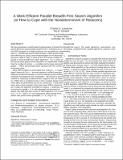A work-efficient parallel breadth-first search algorithm (or how to cope with the nondeterminism of reducers)
Author(s)
Leiserson, Charles E.; Schardl, Tao Benjamin
DownloadLeiserson_A work-efficient.pdf (579.8Kb)
OPEN_ACCESS_POLICY
Open Access Policy
Creative Commons Attribution-Noncommercial-Share Alike
Terms of use
Metadata
Show full item recordAbstract
We have developed a multithreaded implementation of breadth-first search (BFS) of a sparse graph using the Cilk++ extensions to C++. Our PBFS program on a single processor runs as quickly as a standar. C++ breadth-first search implementation. PBFS achieves high work-efficiency by using a novel implementation of a multiset data structure, called a "bag," in place of the FIFO queue usually employed in serial breadth-first search algorithms. For a variety of benchmark input graphs whose diameters are significantly smaller than the number of vertices -- a condition met by many real-world graphs -- PBFS demonstrates good speedup with the number of processing cores.
Since PBFS employs a nonconstant-time "reducer" -- "hyperobject" feature of Cilk++ -- the work inherent in a PBFS execution depends nondeterministically on how the underlying work-stealing scheduler load-balances the computation. We provide a general method for analyzing nondeterministic programs that use reducers. PBFS also is nondeterministic in that it contains benign races which affect its performance but not its correctness. Fixing these races with mutual-exclusion locks slows down PBFS empirically, but it makes the algorithm amenable to analysis. In particular, we show that for a graph G=(V,E) with diameter D and bounded out-degree, this data-race-free version of PBFS algorithm runs it time O((V+E)/P + Dlg[superscript 3](V/D)) on P processors, which means that it attains near-perfect linear speedup if P << (V+E)/Dlg[superscript 3](V/D).
Date issued
2010-06Department
Massachusetts Institute of Technology. Computer Science and Artificial Intelligence Laboratory; Massachusetts Institute of Technology. Department of Electrical Engineering and Computer ScienceJournal
Proceedings of the 22nd ACM symposium on Parallelism in algorithms and architectures (SPAA '10)
Publisher
Association for Computing Machinery (ACM)
Citation
Charles E. Leiserson and Tao B. Schardl. 2010. A work-efficient parallel breadth-first search algorithm (or how to cope with the nondeterminism of reducers). In Proceedings of the twenty-second annual ACM symposium on Parallelism in algorithms and architectures (SPAA '10). ACM, New York, NY, USA, 303-314.
Version: Author's final manuscript
ISBN
9781450300797